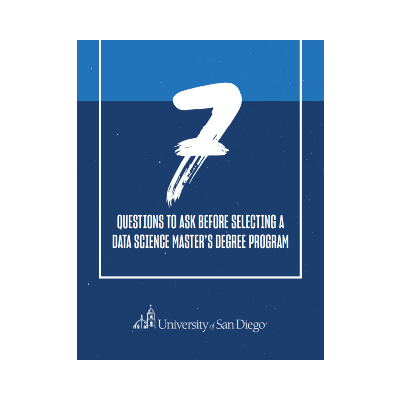Are you launching or advancing a career in data science with an eye toward figuring out what type of role within this multifaceted and fast-growing field makes the most sense for you? You are not alone.
And you are most likely aware that the strong demand for skilled, data-savvy professionals cuts across all industries, and comes with a high salary range. There is plenty of incentive for pursuing this career path, and perhaps even earning your master’s degree to help position yourself for a great job.
Data analyst. Data scientist. Data architect. Data engineer. The possibilities are numerous. This guide to how to become a data engineer gives you a closer look at this specialty, and offers some context with regard to how it connects to other data science roles. Read on to explore:
What is Data Engineering?
Data engineers are chiefly responsible for ensuring that the data used to drive informed strategies, decisions, and actions is production-ready — a process that can consist of proper formatting, scaling, resilience, and security.
Data engineers are often focused on building the infrastructure and “data pipelines” that other team members use to generate valuable insights for the organization. In addition to building and maintaining an organization’s data pipeline systems, data engineers are typically tasked with cleaning and “wrangling” data into a usable state.
QuantHub offers this insightful answer to the question “What is Data Engineering and Why Is It So Important?”
The key to understanding data engineering lies in the “engineering” part. Engineers design and build things. “Data” engineers design and build pipelines that transform and transport data into a format wherein, by the time it reaches the Data Scientists or other end users, it is in a highly usable state. These pipelines must take data from many disparate sources and collect them into a single warehouse that represents the data uniformly as a single source of truth.
What Does a Data Engineer Do?
A data engineer helps build the foundation and infrastructure that enables other team members to transform select data into usable insights and products.
We’ll talk more about specific data engineer skill sets below, but if you want to know what a typical “day in the life of a data engineer” looks like, here are some insights offered by James Miller, a data engineer at BGL Tech:
A typical day will start with a short meeting where I’ll provide a status update to the rest of the team, about the work I did the previous day, what I have planned for the day ahead and any problems or blockers to completing the work I’m doing.
The rest of the day is spent working on the tasks that have been assigned, this might mean writing code, developing an integration process to move and transform data. Talking directly with stakeholders to better understand their requirements and to test and validate work that has been completed. …
It’s a role that is fast-paced and brings me into contact with a lot of other areas of the business.
I enjoy writing code and problem solving, and being able to contribute to producing valuable insight that is used to inform business decisions. … Each day brings something new and varied.
For another first-hand perspective, data engineer Ehi Binitie says (in a “Day in the Life of a Data Engineer” video), “I work with the data scientists and the data analysts – so we’re kind of in the middle. The data scientists design the theoretical components of the system, all the data points that need to be captured, all the information that’s needed – and we’re responsible for designing and building the objects to house that data. The analysts now use the structures that we’ve built to define their reports, to do their analysis, and dig deeper into that information. So, it’s a little bit of investigative work, as well as architectural work. Data science is a team sport.”
Data Engineer Hard Skills
“Data Engineering is one of the most sought-out job in the market these days,” according to data science industry resource KDnuggets, which emphasizes the following hard skills for data engineers:
- Programming languages: “Python! Python! Python!” KDnuggets says an estimated 70% of job profiles list Python as a required skill followed by SQL, Java, Scala, and other programming skills like R, .Net, Perl, Shell Scripting, etc.
- Apache Spark: for data processing layer (other tools: AWS Lambda, Elasticsearch, MapReduce, Oozie, Pig, AWS EMR, etc.)
- Rest APIs: for data collection (other tools: Sqoop, Nifi, Azure Data Factory, Flume, Hue etc.)
- Apache Kafka: for data buffering (other tools: Kinesis, Redis Cache, GCP Pub/Sub, etc.)
- SQL or NoSQL: for data storage (other tools: Hive, AWS Redshift, MongoDB, AWS S3, Cassandra, GCP BigQuery, etc.)
- Tableau or PowerBI: for data visualization (other tools: SAP Business Objects, Qlik, SPSS, QuickSight, MicroStrategy, etc.)
- Cloud Platforms: such as Hadoop, Google Cloud Platform, AWS, Azure, and Apprenda.
Data Engineer Soft Skills
Soft skills needed by data engineers include (according to BurtchWorks and Xplenty.com):
- Interpersonal communication
- Presentation expertise
- Public speaking
- Expository writing
- Collaboration (with other business units)
- Adaptability
- Stress management
- Time management
Become a Data Engineer in 6 Steps
The following steps are beneficial for anyone looking to enter the field of data engineering:
- Obtain a relevant degree
- Pursue a bachelor’s degree in computer science, data science, mathematics, statistics or a related field. Courses should focus on databases, programming languages, data structures and algorithms.
- Consider a master’s degree or Ph.D. in data science, data engineering, or a related field for advanced opportunities, such as USD’s online Master of Science in Applied Data Science.
- Participate in internships or co-op programs to gain practical experience during your studies.
- Earn relevant certifications
- Obtain certifications from industry leaders, such as Google Cloud, AWS, and Microsoft Azure.
- Consider certifications like Google Cloud Data Engineer, AWS Certified Data Analytics, or Microsoft Certified: Azure Data Engineer Associate.
- Join online learning platforms like Coursera and Udacity for certification courses and study materials.
- Regularly update your certifications to stay current with the latest technologies and trends.
- Gain experience and develop skills
- Develop programming skills in languages like Python, Java, or R.
- Learn big data processing frameworks like Apache Hadoop, Spark, and Kafka.
- Master database technologies such as SQL, NoSQL, and data warehousing solutions.
- Familiarize yourself with data integration, transformation, and visualization tools like Apache NiFi, Talend, and Tableau.
- Participate in hackathons, coding competitions, or open-source projects to improve your skills.
- Build a portfolio
- Create personal projects to showcase your data engineering skills and knowledge.
- Publish your projects on GitHub or other code-sharing platforms to demonstrate your proficiency.
- Write blog posts or create video tutorials to share your knowledge and experiences with the community.
- Network with industry professionals through LinkedIn, meetups, or conferences to gain visibility.
- Apply for jobs
- Tailor your resume and cover letter to highlight your skills and accomplishments specific to data engineering.
- Research job postings to identify in-demand skills and technologies.
- Leverage online job platforms like LinkedIn, Indeed, or Glassdoor to find job opportunities.
- Rely on your professional network to learn about job opportunities.
- Prepare for the interview
- Review common data engineering interview questions and practice answering them.
- Prepare a list of your projects and experiences to discuss during the interview.
- Familiarize yourself with the company’s culture, mission, and values to demonstrate your interest and fit.
- Practice technical exercises, such as coding challenges or whiteboard sessions to showcase your problem-solving abilities.
Data Engineer vs. Related Data Science Roles and Job Titles
A comprehensive examination of data engineering as it relates to other data science-related roles and job titles can be found on our University of San Diego Applied Data Science Blog.
This informative post reviews similarities and differences, skill sets, job responsibilities, career paths, and salary information for the following data science-related job titles:
- Data Engineer
- Data Scientist
- Data Analyst
- Data Architect
- Machine Learning Engineer
- Business Intelligence Analyst
- Marketing Analyst
Data Engineer Career Advancement [How to Move Up the Ranks]
Data engineering is typically not an entry-level role. A common pathway is to start as a software engineer, move into data engineering, and then gain experience before advancing into roles demanding greater responsibility, such as senior data engineer, lead data engineer, head of data engineering, and chief data officer.
“Most data engineers start out as software engineers: This job is all about building tools, frameworks, and infrastructure from the ground up,” according to the data engineer career guide offered by Noodle.com. “Even though many data analysts go on to become data scientists, very few make the transition to data engineering.”
Earning a master’s degree is a path many choose when pursuing careers in data science and data engineering. However, as mentioned earlier, there are not a lot of data engineering-specific degree programs. Therefore, some aspiring data engineers find value in tackling a data science master’s degree program that offers data engineering as part of the curriculum.
Data Engineer Salary and Career Outlook
Data engineering and data science are part of a fast-growing field, rich with opportunity for those with the right skills, experience, and education.
Employment website Glassdoor lists the average base pay for data engineers at $115,362, with a high of around $150,000. Indeed lists an average data engineer salary of approximately $129,308. It is important to note that salary estimates vary and are often adjusted in real time based on changing data.
“One solid proof of demand for data engineers is the growth in big data,” according to Toward Data Science. “New data is being generated every day, and it will only continue to grow. With the insane amount of data, there will be an increase in the demand for engineers to handle data. Another giveaway is the growth in big data engineering services provided by consulting firms like Accenture and other tech companies like Cognizant. … The data engineering services market is experiencing [annual] 18% growth, which is expected to hit 31% by 2025.” The 2020 Tech Job Report from Dice also cites extraordinarily fast growth in demand.
Companies Hiring Data Engineers
Data engineers are sought after across nearly all industries, with top industry strongholds including:
- Information technology
- eCommerce
- Finance
- Insurance
- Health care
- Any many more
In terms of specific companies hiring data engineers, AnalyticsInsight.net offers the following look at a number of the top data engineering workplaces plus estimated salary figures:
- Airbnb ($169,316)
- Amazon ($109,000)
- Capital One ($168,552)
- Cisco Systems ($160,000)
- Facebook ($175,881)
- Google ($127,000)
- Microsoft ($165,000)
- Salesforce ($152,000)
Data engineer job search results on LinkedIn reveal listings for positions at: Adobe, Wayfair, Consumer Reports, Liberty Mutual, New Balance, Hulu, Deloitte, CBS interactive, Zoom, Spotify, Twitter, Bloomberg, Expedia, etc.
FAQs About Data Engineer Careers
Q: What are the chief benefits of earning your master’s degree when pursuing a career in data science or data engineering?
A: The benefits of the professional growth experience provided by a quality master’s degree data science program include intensive focus on both the theoretical and practical applications of data science and related fields, as well as robust interaction with faculty instructors who have worked in the field, and advanced training that prepares graduates for success and leadership roles in the workplace.
Q: What is the best way to become a data engineer?
A: The most common career path to a data engineering role is to first gain experience as a software engineer. In terms of education, there are relatively few data engineering degrees at the undergraduate or graduate levels in the U.S. Many aspiring data engineers choose a master’s degree in data science.
Q: What does a day in the life of a data engineer look like?
A: Data engineers often work closely with both data scientists and data analysts – designing and building structures that other team members use to develop high-value, data-driven insights for a wide range of industries and organizations.




